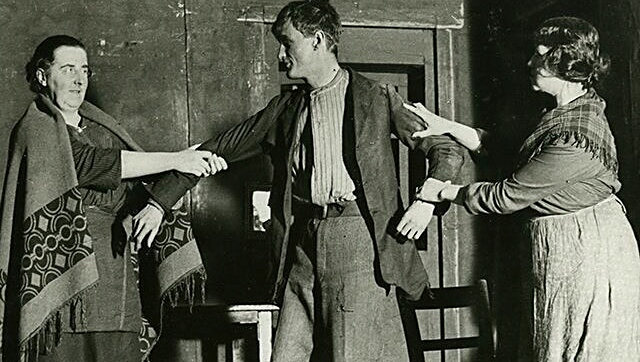
Word of the Day: Orchestra
Today’s word of the day, thanks to the History of English Podcast, episode 176, “All the World’s a Playhouse” (https://historyofenglishpodcast.com/2024/05/09/episode-176-all-the-worlds-a-playhouse/), is orchestra. An orchestra is “a group of performers on various musical instruments, including especially stringed instruments of the viol class, clarinets and flutes, cornets and trombones, drums, and cymbals, for playing music, as symphonies, operas, popular music, or other compositions” (https://www.dictionary.com/browse/orchestra). It can also be “the space reserved for the musicians, usually the front part of the main floor, or orchestra pit,” “the entire main-floor space for spectators,” or “the parquet” (ibid.), which is another word for “the part of the main floor of a theater, opera house, etc., that is between the musicians’ area and the parterre or rear division or, especially in the U.S., the entire floor space for spectators” (https://www.dictionary.com/browse/parquet). Dictionary.com also provides older definitions: “(in the ancient Greek theater) the circular space in front of the stage, allotted to the chorus,” and “(in the Roman theater) a similar space reserved for persons of distinction” (https://www.dictionary.com/browse/orchestra).
The word first appears in English “c. 1600, ‘area in an ancient theater for the chorus,’ from Latin orchestra, from Greek orkhēstra, semicircular space where the chorus of dancers performed, with suffix -tra denoting place + orkheisthai ‘to dance,’ perhaps an intensive of erkhesthai ‘to go, come,’ but not all experts accept that (see Beekes).
“In ancient Rome, orchestra referred to the place in the theater reserved for senators and other dignitaries. Meaning ‘group of musicians performing at a concert, opera, etc.’ is recorded by 1720, so called because they occupy the position of the orchestra relative to the stage ; that of ‘part of theater in front of the stage’ is from 1768 in English” (https://www.etymonline.com/search?q=orchestra).
The shift in the meaning of the word orchestra from a place where the dancers perform to the group of instrumentalists who sit in that place to perform is a type of semantic shift called metonymy, “a figure of speech in which a concept is referred to by the name of something closely associated with that thing or concept” (https://en.wikipedia.org/wiki/Metonymy). Keep in mind that languages change over time. They don’t “evolve,” and they don’t “devolve.” They just change.
On this date in 1899, the Irish Literary Theatre opened in Dublin, Ireland.
In 1893, the Gaelic League was formed from the ashes of the Gaelic Union. The purpose behind the Gaelic League was to revive Irishness among the people of Ireland. There is a long history of conflict and conquest between the English and the Irish, and one result of that was the conscious decision of the English to eliminate Irishness. This was done mostly be trying to eradicate the Irish language, Gaelic. “Analysis of the 1881 Census showed that at least 45% of those born in Ireland in the first decade of the 19th century had been brought up as Irish speakers. Figures from the 1891 census suggested that just 3.5% were being raised speaking the language. Ireland had become an overwhelmingly English-speaking country. Spoken mainly by peasants and farm labourers in the poorer districts of the west of Ireland, Irish was widely seen, in the words of Matthew Arnold, as ‘the badge of a beaten race’” (https://en.wikipedia.org/wiki/Conradh_na_Gaeilge).
In addition to a revival of the Irish language, the Gaelic League helped to start what is called the Irish Literary Revival (or Irish Literary Renaissance). Including W. B. Yeats, “the Irish Literary Revival was deeply engaged in a renewed interest in Ireland’s Gaelic heritage as well as the growth of Irish nationalism during the nineteenth century. Indeed, the Irish Literary Revival was only a part—though a significant one—of a more general national movement called the ‘Gaelic Revival’, which engaged in Irish heritage on the intellectual, athletic, linguistic, and political levels” (https://www.rem.routledge.com/articles/irish-literary-revival). Oddly, most of the work published or performed in the Irish Literary Revival was in English, so it is sometimes called the Anglo-Irish Revival. Of course, given how many people actually spoke Gaelic, it is not a surprise that Yeats and Lady Gregory and John Millington Synge, among others, wrote in English.
As part of the Revival, Yeats and Lady Isabella Augusta Gregory and some others started the Irish Literary Theatre, which opened this day in Dublin in 1899. Sadly, it produced only a few plays before it was forced to close because of a lack of money. A couple years or so later, the Abbey Theatre (also called the National Theatre of Ireland) opened, and it has stayed open until today.
Probably the most famous performance of the Abbey Theatre was the opening of John Millington Synge’s 1907 play The Playboy of the Western World, a drama/comedy about the working class in rural Ireland. “The play is known for its use of the poetic, evocative language of Hiberno-English, heavily influenced by the Irish language, as Synge celebrates the lyrical speech of the Irish” (https://en.wikipedia.org/wiki/The_Playboy_of_the_Western_World). It is a very good play, and very entertaining, but what makes if famous is this: “Riots occurred in January 1907 during and following the opening performance of the play. The riots were stirred up by Irish nationalists and republicans who viewed the contents of the play as an offence to public morals and an insult against Ireland. The riots took place in Dublin, spreading out from the Abbey Theatre and finally being quelled by the actions of the Dublin Metropolitan Police” (ibid.).
Riots at play? Well, keep in mind that there were riots at the opening of Stravinski’s Rites of Spring just six years later. Frankly, I wouldn’t want to have been in the orchestra for either of those performances.
Today’s image is from J. M. Synge’s Playboy of the Western World, produced at the Abbey Theater (https://booknormblog.wordpress.com/2018/01/26/today-in-literary-history-january-26-1907-j-m-synges-the-playboy-of-the-western-world-premiers-in-dublin-causing-riots/).